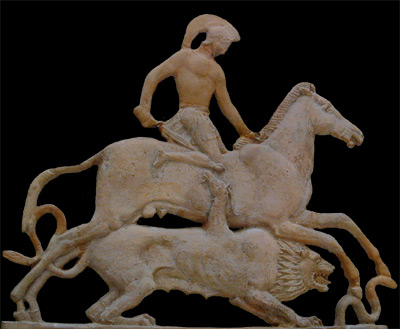
Pegasus

The winged horse Pegasus is most closely connected with the Greek city of Corinth, on whose early coins it appears. When Syracuse, the daughter colony of Corinth in Magna Graecia, overthrew its tyrants, it placed the democratic motifs of its mother colony on its coins. For the Romans Pegasus was a symbol of immortality.
Medusa, a daughter of sea deities, had been impregnated by the sea god Poseidon, who took the form of a horse. When the hero Perseus cut off Medusa's head with the aid of Athena, Pegasus was born from her blood (see the pediment of the temple of Artemis at Corfu). The force with which he fell to the ground caused a fountain, Pirene, to spring up under his hoof. Tarsus, a Cilician city renowned for its scholarship, attributed its name to the feather which fell to the ground from Pegasus at birth.
The Greek hero Bellerophon, son of Poseidon, captured Pegasus at the fountain of Pirene with the help of Athena and rode him in his battle against the Chimaera and the Amazons. In Horace Carmina 4.11, line 25 he refers to the story of Bellerophon and Pegasus.
